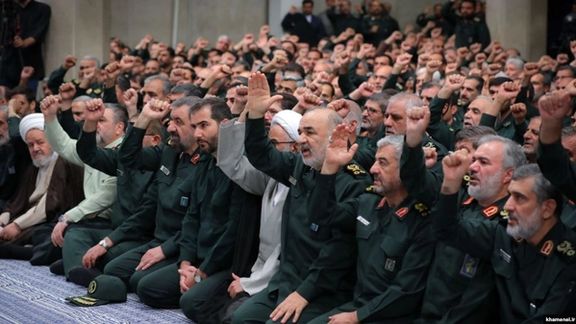IRGC Receives More Crude Oil From Government To Export

Iran’s Revolutionary Guard (IRGC) will get 20 trillion rials ($80 million) worth of crude oil to finish construction projects for the country’s prayer grounds.

Iran’s Revolutionary Guard (IRGC) will get 20 trillion rials ($80 million) worth of crude oil to finish construction projects for the country’s prayer grounds.
The spokesman of the parliament's budget review committee, Rahim Zar’e, said on Wednesday that the barter has been approved by the committee.
IRGC’s Khatam-al Anbiya Construction Headquarters, which is the engineering arm of the IRGC and one of Iran's largest contractors in industrial and development projects, is set to allocate half of the amount to complete the construction of Grand Mosalla mosque of Tehran while the other half will be spent on similar projects across the country.
The Grand Mosalla (literally meaning prayer grounds or mosque) is a huge patch of land in Tehran that was proposed in 1982 to replace Tehran University as a location for the weekly Friday congregation. Its construction began in 1990 by the IRGC but the complex has not been completed and has largely served as a venue for exhibitions.
The administration of President Ebrahim Raisi is giving a lot of projects to different sections of the IRGC in return for crude oil that Tehran cannot sell due to sanctions, including a $3 billion project for rice production.
Involvement of the IRGC in business began in earnest two decades ago and has become a highly controversial issue in the country. Former president Hassan Rouhani in 2017 publicly criticized the practice and met a quick reaction by hardliners. He has to retract his statements at the time.
Iran has expanded barter to circumvent United States ‘maximum pressure’ sanctions, which threaten punitive action against any third party buying Iranian oil or dealing with Iran’s financial sector. Bartering oil for imports of animal feed and agricultural products has proved particularly viable.
The government has announced that 4.5 billion euros worth of crude oil will be put at the disposal of the armed forces to sell. This means the lion’s share will go to the IRGC, which must find middlemen and illicit ways to export the oil, giving rise to corruption.
Tehran’s city council has also announced its intention to hand over major projects to the Revolutionary Guard, despite serious allegation of large-scale corruption during the mayorship of a former IRGC general Mohammad Bagher Ghalibaf (2005-2017). He is now speaker of parliament
The same scenario happened during the administration of Mahmoud Ahmadinejad in the early 2010s, when for example the police was given oil to sell to provide for its needs. In the end it came to light that nearly $200 million in 2012 was never returned to the country.
A businessman, Babak Zanjani, who is now in jail with the death penalty hanging over his head, was a middleman selling oil during international sanctions also in the early 2010s. He failed to pay back at least $2.7 billion. His accomplices in the government were never identified. It would have not been easy for him to embezzle such a large amount of money without insider support.